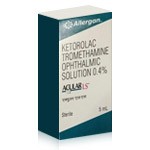Post-Operative Eye Inflammation: Causes, Duration and Treatment


Eye surgery, whether for cataracts, glaucoma, or other ophthalmic conditions, can often lead to post-operative inflammation. This condition, while typically manageable, can cause discomfort and, in some cases, complications if not addressed properly. Understanding the causes, duration, treatment options, and role of medications such as Acular LS can help ensure a smooth recovery process.
How Long Does Inflammation Last After Eye Surgery?
Post-operative inflammation in the eye is a natural response to surgical intervention. Typically, mild to moderate inflammation lasts for a few days to a couple of weeks. However, in some cases, it may persist for a month or more, depending on factors such as the type of surgery performed, the patient’s overall health, and how well post-operative care is followed.
For example, after cataract surgery, inflammation generally peaks within the first few days and gradually subsides within two to four weeks. Patients undergoing more invasive procedures may experience a prolonged inflammatory response. If inflammation persists beyond the expected recovery period, it may indicate an underlying issue such as infection, an immune reaction, or a secondary complication requiring medical intervention.
Additionally, individual healing responses vary. Some patients, particularly those with autoimmune disorders or diabetes, may take longer to recover due to a heightened inflammatory response. In contrast, individuals who closely follow post-operative care instructions, including using prescribed anti-inflammatory medications, tend to recover more quickly and experience fewer complications.
What Causes Inflammation in the Eye Post-Surgery?
Inflammation following eye surgery occurs as part of the body’s natural healing process. The procedure itself can cause microscopic trauma to the ocular tissues, prompting an immune response. This response leads to swelling, redness, and discomfort as the eye attempts to repair itself. Several factors contribute to post-operative inflammation, including:
- Tissue Trauma: Even with minimally invasive techniques, surgical instruments can disrupt delicate eye structures, triggering inflammation.
- Immune Response: The body reacts to surgical intervention by sending white blood cells to the affected area, leading to swelling and irritation.
- Residual Lens Material (After Cataract Surgery): If fragments of the natural lens remain after cataract removal, they can incite an inflammatory reaction.
- Infections (Endophthalmitis): Bacterial or fungal infections introduced during surgery can cause severe inflammation.
- Preexisting Conditions: Patients with diabetes, autoimmune diseases, or previous eye surgeries may be more prone to prolonged inflammation.
- Post-Surgical Complications: Secondary conditions such as cystoid macular edema (CME) or increased intraocular pressure can exacerbate inflammation.
In rare cases, prolonged inflammation can indicate a rejection reaction to intraocular lenses (IOLs) implanted during cataract surgery. This occurs when the eye perceives the artificial lens as a foreign object, triggering an extended immune response.
How Do You Reduce Eye Inflammation After Surgery?
Effective management of post-operative eye inflammation is essential to ensure proper healing and prevent complications. The approach typically involves a combination of medications, lifestyle modifications, and careful monitoring by an ophthalmologist.
Topical Medications:Anti-inflammatory eye drops, including corticosteroids and nonsteroidal anti-inflammatory drugs (NSAIDs), are commonly prescribed. These medications help reduce swelling, redness, and discomfort by inhibiting the inflammatory response. Acular LS, a frequently used NSAID, plays a crucial role in managing post-operative inflammation, particularly after cataract surgery.
Cold Compresses and Rest:Applying a cold compress to the closed eyelid can provide relief by constricting blood vessels and reducing swelling. Additionally, avoiding strenuous activities and giving the eyes ample rest can aid the healing process.
Protective Measures:Wearing sunglasses and an eye shield, as recommended by the surgeon, helps protect the eye from irritants such as dust, wind, and bright light. Additionally, avoiding rubbing the eyes is critical to prevent aggravating inflammation.
Medical Supervision:Regular follow-up visits with the ophthalmologist allow for monitoring of the healing process and timely adjustments to treatment if needed.
In some cases, oral anti-inflammatory medications may be required if topical treatments are insufficient in controlling the inflammation. Severe inflammation might necessitate more aggressive treatment approaches, such as injectable steroids.
Symptoms of Eye Inflammation After Cataract Surgery
Cataract surgery is one of the most commonly performed ophthalmic procedures, and while the success rate is high, post-operative inflammation is a frequent occurrence. Recognizing the symptoms of inflammation is crucial for ensuring prompt treatment and preventing complications. Common symptoms include:
- Redness and Irritation: The eye may appear bloodshot due to dilated blood vessels responding to the inflammatory process.
- Swelling: The eyelids or surrounding tissue might become puffy, and the cornea may exhibit mild to moderate edema.
- Pain or Discomfort: A dull aching sensation, foreign body sensation, or increased sensitivity to light (photophobia) can occur.
- Blurred Vision: Temporary visual disturbances, such as haziness or decreased clarity, are often reported.
- Excessive Tearing: Increased tear production is a natural response to irritation.
- Floaters or Light Flashes: In some cases, patients may notice new floaters or light flashes, which should be evaluated to rule out retinal complications.
While mild symptoms are expected, severe or worsening symptoms — such as intense pain, sudden vision loss, or pus-like discharge — require immediate medical attention, as they may indicate a serious infection or other complication.
The Role of Acular LS in the Treatment of Post-Operative Inflammation
Acular LS (Ketorolac Tromethamine) is a nonsteroidal anti-inflammatory drug (NSAID) commonly used to manage post-operative eye inflammation, particularly following cataract surgery. Unlike corticosteroids, which suppress the immune response broadly, NSAIDs target specific inflammatory pathways without significantly increasing intraocular pressure, making them a preferred option for many patients.
How Acular LS Works: Acular LS inhibits cyclooxygenase (COX) enzymes, which are responsible for the production of prostaglandins — key mediators of inflammation. By reducing prostaglandin synthesis, the drug helps decrease swelling, pain, and redness without the side effects commonly associated with steroid treatments.
Benefits of Acular LS:
- Provides effective relief from inflammation without increasing intraocular pressure.
- Helps prevent cystoid macular edema (CME), a common complication after cataract surgery.
- Reduces pain and discomfort, improving overall patient comfort.
- Safe for extended use under ophthalmologic supervision.
Additionally, Acular LS is often used in combination with other post-operative medications, such as antibiotics and steroid drops, to provide comprehensive anti-inflammatory and antimicrobial protection.
Conclusion
Post-operative eye inflammation is a common but manageable condition following eye surgery. Understanding the causes, expected duration, and appropriate treatment strategies can significantly enhance recovery outcomes. The use of medications such as Acular LS plays a vital role in controlling inflammation, ensuring comfort, and preventing complications. Patients are encouraged to follow their ophthalmologist’s advice closely, attend follow-up appointments, and adhere to prescribed treatment regimens to achieve the best possible healing and vision restoration. By taking these proactive steps, individuals can minimize discomfort and maximize their chances of a successful post-surgical outcome.
Article Post: Editorial Team of RXShop.md
(Updated at Mar 31 / 2025)

